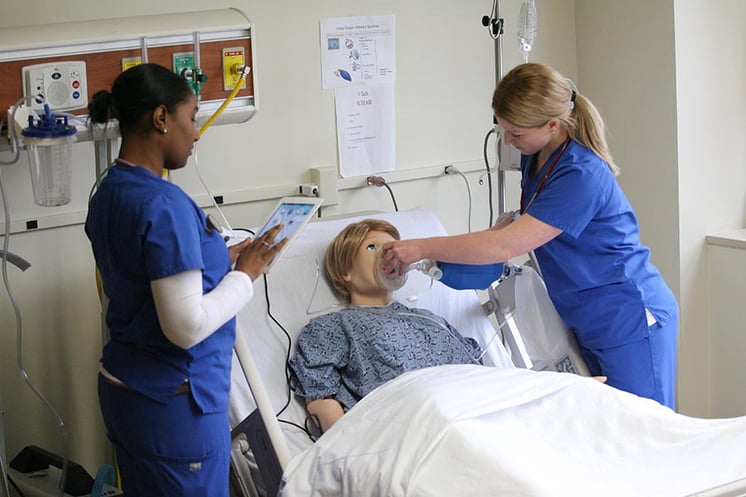30 Types of Nurses Employers are Hiring Right Now in 2022
Are you exploring different types of nursing jobs to decide the best fit? In this guide, learn more about the types of nursing jobs and salaries available.
If you’re searching for information on healthcare careers, you may be pondering the question of whether nursing is right for you. You might ask “What is a nurse?”
Technically, a nurse is a person who has graduated from nursing school. And a licensed nurse has passed a national exam and earned a license to practice nursing in their state. Okay, simple enough!
But to get an even better idea of whether nursing is the right career for you, you might want to ask “What do nurses do?”
This is a great question but it doesn’t have a simple answer because there are many different types of nurses, different places nurses can work, and a wide variety of roles that nurses can fill.
Many new nurses begin their careers working in a hospital. The new nurse is provided with a preceptor who guides them through their first weeks on the job, teaching them the specific skills and knowledge they will need to be successful in the area in which they work.
As the nurse gains more knowledge and skills, they might decide they want to specialize in one area of nursing or go back to school to become a nurse practitioner. Or they may leave bedside nursing to become a legal nurse consultant or a nurse case manager for an insurance company. Nursing is a flexible career which makes nursing so appealing to many people.
However, it may help to know that nursing schools prepare all students to enter the workforce by teaching them basic nursing skills. Let’s look at what some of those basic skills are, including two skills that make nurses stand out among other healthcare professionals.
A nursing job description might look like this:
Take a closer look at that last bullet point. Collaboration is one of the nurse’s superpowers. Collaborating means helping the entire healthcare team work together for the good of the patient. It’s what makes nurses the point person on the healthcare team, the one team member everyone else calls when they don’t have the answer to a question.
Collaboration and advocating for patients are skills that make what nurses do different from other healthcare team members. Nurses care for the whole patient, not just their heart condition, or their asthma, or their urinary tract infection.
Let’s look at an example of how this may work in real life.
Mrs. Smith is in the hospital after having heart surgery. The nurse knows that Mrs. Smith is worried about how well Mr. Smith is eating without her there to cook for him. The nurse knows that the stress that Mrs. Smith is feeling can affect her heart condition. The nurse works with Mr. and Mrs. Smith to identify neighbors or family who can drop off food for Mr. Smith so that Mrs. Smith doesn’t have to worry so much. Mrs. Smith can focus on recovering from surgery so that she can get well enough to go home and start cooking for Mr. Smith again.
The nurse also knows that Mrs. Smith can only attend her follow-up appointment on Tuesday because that’s the day that her daughter is off from work and can bring her to the clinic. So when Mrs. Smith is discharged and her follow-up appointment is scheduled for Monday, the nurse advocates for Mrs. Smith by calling the clinic and requesting that they change the appointment to Tuesday.
The nurse is the healthcare worker that holds everyone accountable to the patient, keeps the lines of communication open, and binds the team together.
Advocacy and collaboration are some of the reasons that nursing is the most trusted profession. Nurses also make sure patients are informed about their healthcare choices and that their decisions are honored.
Now that we’ve reviewed what nurses do and how they are different from other healthcare workers, let’s take a look at how you can become a nurse, the different types of nurses, and the different nursing credentials.
You can start your nursing career as an LPN or an RN. The nursing program you choose will depend on the level at which you want to start your nursing career, how soon you need to earn an income, and what you would like to do with your nursing degree and license.
And if you aren’t sure you want to be a nurse, consider working a different job in healthcare before investing in a nursing program. Becoming a certified nurse assistant (CNA) can be a great way to get experience working directly with patients. CNA programs take only a month or two to complete and prepare the student to take a state certification exam.
There are three types of nurses: the licensed practical nurse (LPN), the registered nurse (RN), and the advanced practice registered nurse (APRN).
The LPN
LPNs take a national licensing exam after completing a nursing program that lasts about one year. LPNs are valuable members of the healthcare team who provide basic nursing care to patients, such as obtaining vital signs, helping patients with bathing, dressing, and feeding, and providing wound care.
In some states, LPNs are allowed to give medications. LPNs are usually supervised by registered nurses and medical providers.
While LPNs can fill some supervisory roles, depending on where they work, they are limited in how far they can advance their career. Without at least an associate degree in nursing, LPNs cannot become an RN and aren’t eligible for advanced certifications. And LPNs typically don't have the educational background to work in specialty areas such as adult or pediatric intensive care or transplant units.
If you’re an LPN and want to become an RN, there are nursing schools in MA, such as Labouré, that offer a fast-track LPN to RN associate degree program that will prepare you to take the NCLEX-RN licensure exam. With Labouré’s flexible program options and three start dates per year, you can even continue to work while attending nursing school.
The RN
RNs can take on leadership roles and work in specialty areas such as critical care units or public health. Students seeking an RN license first need to graduate with a diploma, two-year associate degree, or four-year bachelor’s degree. Graduates are eligible to take the NCLEX-RN exam and earn their RN license.
Labouré’s Associate of Science in Nursing (ASN) program offers flexible options, such as online or in-person general education courses and full or part-time schedules. And Labouré partners with multiple facilities in the Greater Boston area for student clinical rotations. With three start dates per year, including spots available in the September 2024 semester, you could be sitting for your NCLEX-RN exam in two years!
If you’re already an RN, an RN to BSN program is a fast-track way to a bachelor of science in nursing degree. Within 16 months, the RN can obtain their BSN through Labouré’s flexible online program.
Whether you are an RN wanting to advance your career or are a new high school graduate planning to attend a four-year college, getting a bachelor of science in nursing degree can open the door to specialized roles, such as certified clinical specialist, clinic supervisor, health coach, forensic nurse, nurse informaticist, or health policy nurse.
The APRN
An APRN requires a master’s or doctoral degree. Your choice of graduate program will depend on what patient population you’d like to work with.
APRN roles include
Nurse practitioners work in many areas of healthcare, including newborn intensive care, orthopedics, adult intensive care units, pediatrics, geriatrics, and in primary care clinics.
Graduate degrees can also open other career avenues, such as in nursing research or as a nurse educator, or in administration, such as chief nursing officer of a hospital.
Whether you are looking for a new career or want to take your nursing career to new heights, Labouré offers three options for beginning or advancing your nursing career. Learn more about how Labouré can help you become a nurse and be a part of the most trusted profession.
Ready to get started?

Are you exploring different types of nursing jobs to decide the best fit? In this guide, learn more about the types of nursing jobs and salaries available.

Laboure College shares common titles in the nursing profession: Registered Nurse Home Care Nurse Nurse/Staff Nurse Critical Care Nurse

Alex Pilla is a student nurse at Labouré College already making a difference in the lives of her patients.
© 2024 Labouré College of Healthcare. All Rights Reserved.
Comments